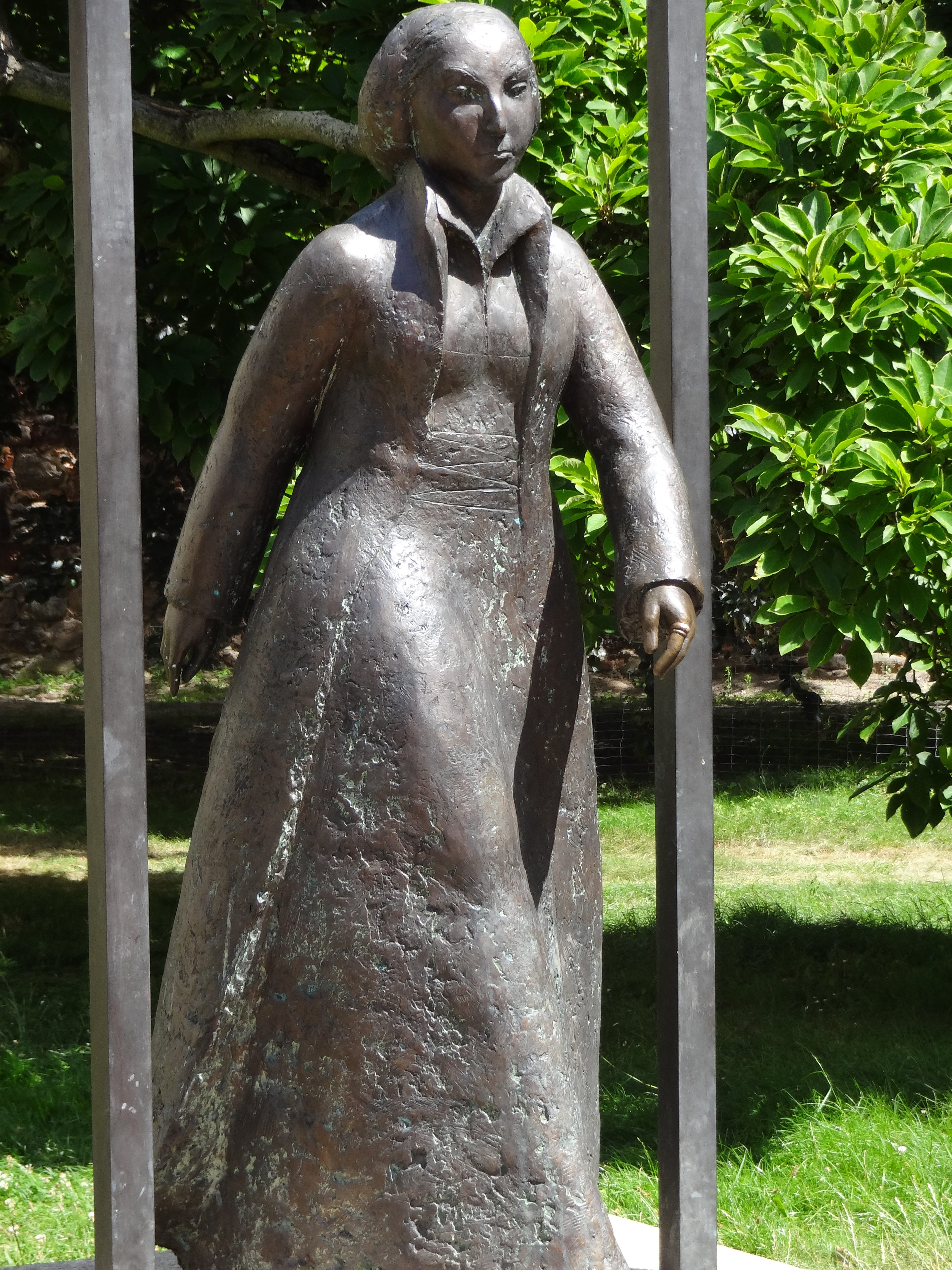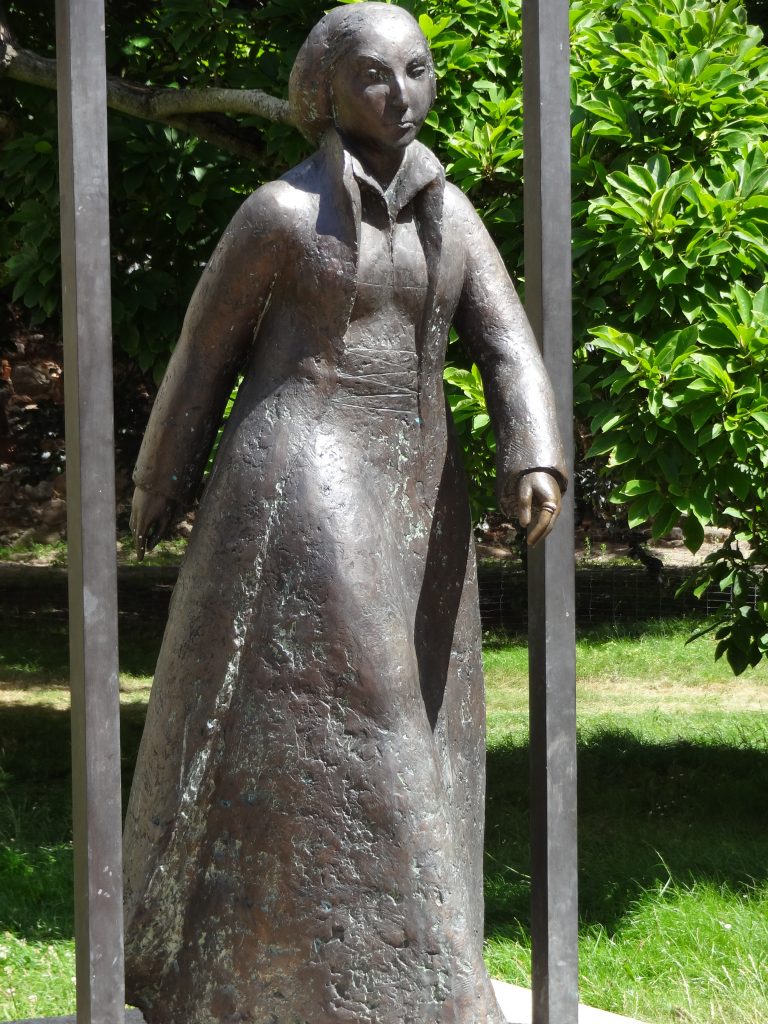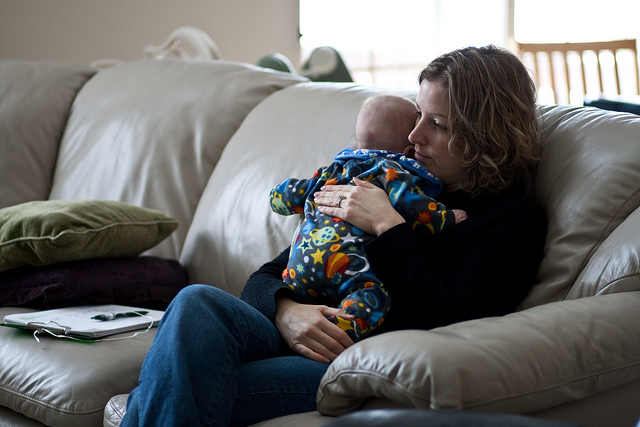
Strength in Weakness?

By Elizabeth Ahlman
While we were living in Leipzig, Germany, my family and I had several opportunities to visit Lutherstadt Wittenberg. In the courtyard of the Black Cloister is one of my favorite statues. It’s Katie Luther, full skirts swishing out, arms pumping, looking as if she was striding purposefully across that courtyard.
If anything depicts a womanly strength, it’s that statue.
Katie looks all business, as if ready to take on anything — as if ready to go to battle on her own little homefront (or not so little, as the Black Cloister was actually huge). Historians and perhaps lore tell us that Katie was strong and bold – she brewed beer! She grew a garden! She fed and housed students in the Cloister, raised children, bought and farmed her family’s land, and kept the Luthers afloat financially when Martin would take no money for his writings.
It brings to mind another image – that of the woman of Proverbs 31:10-31 – that woman of chayil – girding her loins, fastening back her sleeves, and setting off to do battle for her household.
As I note in my book, Demystifying the Proverbs 31 Woman, this word chayil, which is often translated as “worthy” or “excellent” is actually full of militaristic overtones and most often means “strength” or even “army” in the Old Testament. It’s usually used of men, specifically, soldiers (it’s only used of a woman in one other place – the Book of Ruth). Here are some examples:
Ezekiel 38:15 (here translated as “army”): “You will come from your place out of the uttermost parts of the north, you and many peoples with you, all of them riding on horses, a great host, a mighty army.”
2 Samuel 22:40 ESV (here translated as “strength”): “For you equipped me with strength for the battle; you made those who rise against me sink under me.”
1 Samuel 14:52 ESV (here translated as “valiant”): There was hard fighting against the Philistines all the days of Saul. And when Saul saw any strong man, or any valiant man, he attached him to himself.
These verses and many others refer to men of “valor” or “strength” or actually use the word chayil to mean “army.” In some verses, the men of valor are taking up arms. Or David is described as he prepares to do battle. In some verses, it is translated as “able/capable,” when strong and courageous men are needed to handle difficult tasks, fight battles, or guard and protect things of value.
At first glance, of course, this imagery seems quite different from how we might picture the woman of Proverbs 31, or even Katie Luther. And yet, the writer of the hymn to this woman in Proverbs 31 clearly has militaristic and strength meanings in mind.
In verse 31:15 she is said to provide “food” for her household in terms that connote “prey,” as if she is a huntress.
Verse 17 depicts her dressing herself with strength. The imagery is that of her adjusting her clothing and preparing so that she can work the loom with phrases associated with battle and soldiers. She literally “girds her loins’ and fastens her sleeves back.
Verses 19 & 20 see sharp aggressive movements in the way she handles the distaff and spindle, as if she is thrusting these tools out, and working them with something like aggression. The Hebrew words are those used of Jael as she grabs the hammer and tent peg before driving it through Sisera’s skull (imagine the strength needed in your arms…and your stomach…for such a task!).
Fierce and ready, girded and prepared, the woman successfully cares for her household.
And how I’d like to picture myself that way – chin up, looking purposeful and fierce, sleeves rolled up, striding across my own little domain, wielding the tools of my vocations with strength.
All under control. Physical strength. Inner strength. Easily possessed and used.
And some days, I am that, or appear to be, at least for a short time. Usually in the morning. I’m striding purposefully through my abode feeding children, baking bread, throwing in laundry loads, making applesauce in my Instant Pot, and so on.
I am on it. Like Katie Luther or the Proverbs 31 woman. Seemingly strong and capable. And it lasts for at most the morning.
Then it hits a snag.
Energy wanes, efficiency flounders, or resentment kicks in. Or, just the demands and needs of my children interrupt the other plans I had for the day (poopsplosion! Brother-sister fighting! Baby has chalk in her mouth!)
It doesn’t help that in so many ways, society often depicts women as leaning on their own strength. They have and do it all, with a perfect hair do and a business suit. “Women are FIERCE!” shouts the media.
But when they shout these things, they are assuming that women are relying on their own strength. They are teaching us to put our trust in ourselves and our abilities, rather than in our Savior and our Heavenly Father.
Husbands are often portrayed as just one more person/thing over which we must exert our strength. In the workplace, and on the homefront, says so much of society, women should be striding around with purpose, heads up, breaking glass ceilings and relying on what is in them to make things happen and have success. And superficial readings of Proverbs 31:10-31, and superficial “readings” of Katie Luther’s life, only seem to agree with society’s take on how women should rely on their own strength, which is formidable.
But I know I let society down on those other days when I feel weak from the word “go.” I’m drowning and can’t get on top of it. Failure presses in on me – real and imagined. I feel no strength. I don’t live up to Katie Luther’s statue or the Proverbs 31 woman’s strength and grace.
 I feel more like Katie Luther’s epitaph – still, silent, not too healthy looking, weak and, yes, sometimes even feeling as though I am standing on the edge of a precipice of sorts. Despair maybe. Or perhaps even the edge of my grave.
I feel more like Katie Luther’s epitaph – still, silent, not too healthy looking, weak and, yes, sometimes even feeling as though I am standing on the edge of a precipice of sorts. Despair maybe. Or perhaps even the edge of my grave.
When I look to myself for strength, I despair.
It is then that repentance and comfort must and do come for me, who has relied upon myself for chayil and not the one who truly is and has and gives chayil.
Only in Christ, the strong man who has truly swept my “house” clean, am I made strong. It is only in Christ, the most worthy one, that I am made worthy.
And the same goes for Katie Luther, whether striding across her courtyard, mourning the loss of several of her children, fearfully fleeing Wittenberg ahead of the plague, or lying frail in her grave (but notice how she is clutching the Bible in her epitaph).
And the same goes for you on the days you feel strong, on the days you feel weak, on the days you are proud of your own achievements and credit them to your own strength, and on the days when you see nothing but failures.
Our worth is not in our own strength and the things we “do” with it, but rather in the One who has gifted His strength to us for this life and the life to come.
Photo credit: Elizabeth Ahlman




One Comment
Lisa Stapp
I find this exceptionally useful–I have Spinal Muscular Atrophy and physical weakness is something I know quite well.